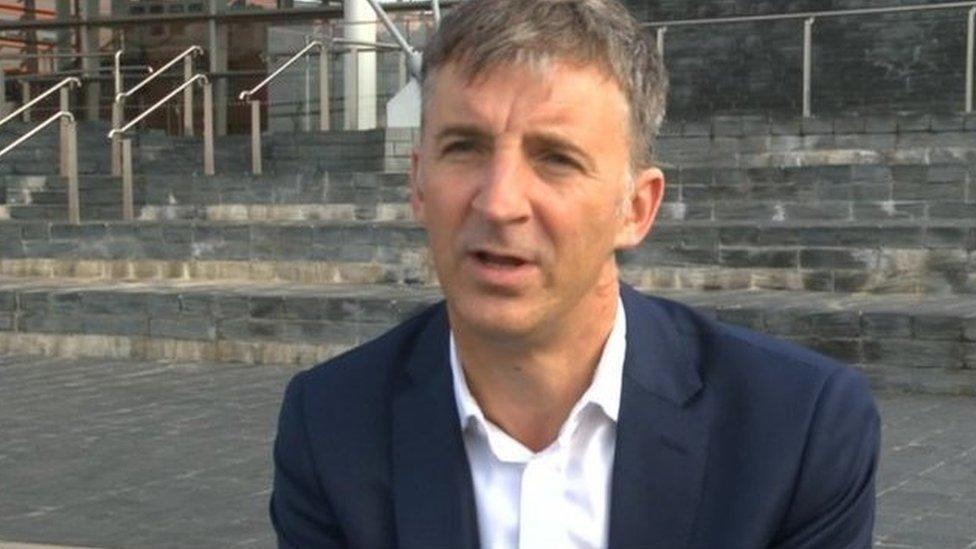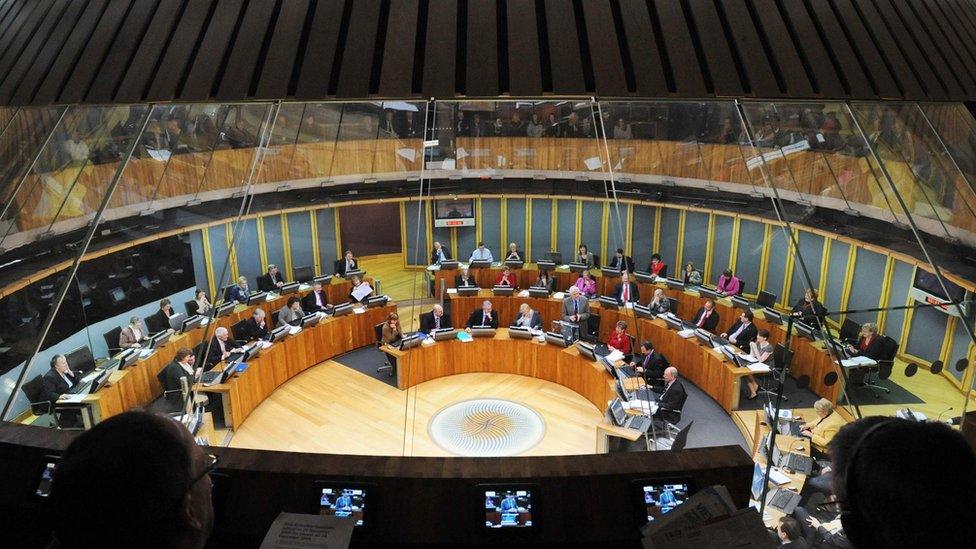Row over UK 'veto' of Welsh laws in Wales Bill debate
- Published

Lord Judge said the measures contained in the Wales Bill would "wipe out" laws created by the Welsh assembly
Powers allowing the UK government to overturn laws made in Wales have been criticised by a former lord chief justice as an "insult" to democracy.
Lord Judge lambasted measures in the Wales Bill which he said could allow UK ministers to change assembly legislation without Parliament's say.
The independent peer called including the a "constitutional aberration".
A Wales Office spokesman said the power was simply to "fine tune" the new devolution settlement.
The proposed Wales Bill - which devolves new powers to the Welsh assembly including over fracking and changes the way it makes laws - is being considered in its final stages in the House of Lords.
The row erupted as the Lords discussed amendments to the bill, including giving the Welsh Government the powers to ban high-stakes gambling machines and scrapping a clause allowing UK ministers to block some laws made in Wales about water.

Lord Judge, the most senior judge in England and Wales between 2008 and 2013, was critical of measures - known as the Henry VIII clauses, external - contained in the bill which he said would allow laws passed by the Welsh assembly to be changed by ministers in London without Parliament's consent.
Lord Judge said: "This is the malevolent ghost of King Henry VIII wandering through the Valleys of Wales."
"Actually it is an insult to the democratic process which this Parliament created when the National Assembly of Wales was created," he added.
Lord Judge said the House of Lords should be "embarrassed" that it had allowed such a measure to be put in place in Scotland.
Plaid Cymru peer Lord Wigley, also criticised the clauses, describing them as "arcane and undemocratic".
This is not the first time a row has broken out during the passage of the bill, last year First Minister Carwyn Jones said measures in it amounted to an "English veto on Welsh laws".
But the Wales Office denied the clauses gave UK ministers any more power than Welsh ministers, insisting they were "simply a power to do the fine tuning needed to implement the new devolution settlement for Wales set out in the Wales Bill".
A spokesman said: "A significant number of assembly acts give Welsh ministers reciprocal powers to change parliamentary legislation without Parliament's approval in order to implement assembly legislation.
"This power is part and parcel of the consequential powers held both by UK ministers and Welsh ministers."
The spokesman added that Welsh Secretary Alun Cairns had written to First Minister Carwyn Jones and Presiding Officer Elin Jones committing himself to working closely with the Welsh Government and the assembly "on any regulations that need to be made which modify assembly legislation".
A Welsh Government spokesman said: "It is clear that the former Lord Chief Justice, Lord Judge, shares our concerns about provisions he describes as a 'constitutional aberration'.
"It is disappointing that the UK government has not felt able so far to respond effectively to our, and his, arguments."
Capel Celyn was flooded in 1965 to create Tryweryn reservoir, to supply water for the people of Liverpool
The UK government also faced calls to guarantee Welsh communities would never again be sacrificed to provide water for England.
In 1965, the village of Capel Celyn was flooded to create the Tryweryn reservoir to provide Liverpool with water, under a law passed in 1956.
Last month Welsh Secretary Alun Cairns said he would scrap his ability to block some laws made in the assembly about water under changes to the Wales Bill.
But Lord Wigley said the amendments failed to deliver on the promise, instead stating a protocol may be put in place to protect English consumers and Wales.
Labour peer and assembly member Baroness Morgan of Ely called for the UK government to clarify exactly what was in the protocol.
But Lord Bourne said Tryweryn could not happen again and the issue was unaffected by the Wales Bill.
The bill is scheduled to be discussed in the House of Lords again on 10 January.
- Published31 October 2016

- Published30 October 2016

- Published28 October 2016

- Published29 February 2016
